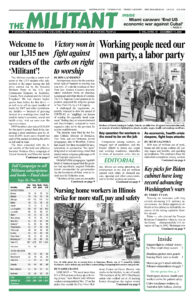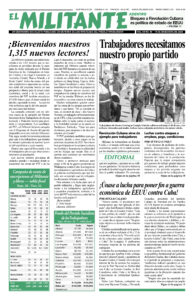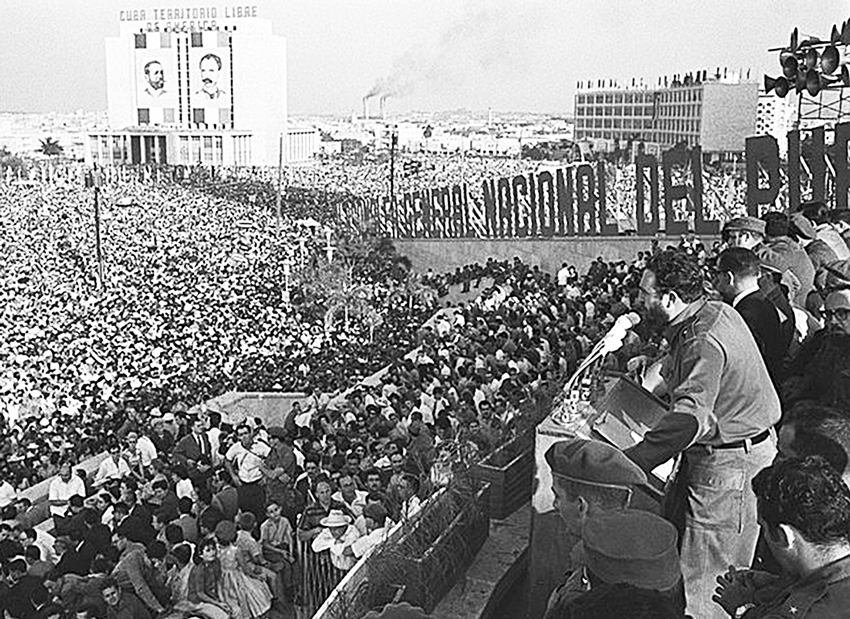Fidel Castro: Nothing Can Stop the Course of History, one of Pathfinder’s Books of the Month for December, is a wide-ranging interview given by the central leader of the Cuban Revolution in 1985. His interviewers were Jeffrey M. Elliot, a U.S. journalist, and Mervyn M. Dymally, a U.S. congressman. The excerpts are from the section where Castro explains that the revolution — from the battles in the mountains in the 1950s to today — has never engaged in repression or reprisals against those with different views, but relies entirely on a people “who had ideals, thoughts, revolutionary fervor, and strong ideological motivations for supporting the revolution.” This enabled Cuba’s workers and farmers to take political power into their own hands and defend it over decades from Washington’s implacable hostility. Copyright © 1986. Reprinted by permission of Pathfinder Press.
JEFFREY M. ELLIOT: The U.S. press has reported, on numerous occasions, that Cuba’s prisons are filled with a large number of political prisoners — men and women who dared to criticize your regime. And many in the U.S. believe this to be true. Do you deny this charge?
FIDEL CASTRO: There was a time, naturally, when there were a lot of counterrevolutionary prisoners. But there were reasons for that. During the first few years after the triumph of the revolution, when U.S. hostility against our country began — when the CIA began infiltrating weapons, explosives, saboteurs, and established armed gangs in all provinces and dozens of counterrevolutionary organizations, giving them not only material aid but also political and moral support — how could we help having a lot of prisoners? For instance, we captured over 1,200 invaders immediately after the Playa Girón mercenary invasion. Ask those invaders — whom we later returned to the United States in a ship loaded with “heroes” — if any of them were beaten, if any of them were tortured, if any of them were ill-treated. …
Our courts hand down verdicts based on laws to punish counterrevolutionary actions. The idea that anyone is punished in our country for professing belief other than those of the revolution is absolutely ridiculous. There are tens of thousands of people whose political and religious concepts and beliefs differ from those of the revolution. They have full legal guarantees. …
[N]o matter what our enemies may say, or how much they may lie and slander us, the history of the revolution is free of cases of physical abuse or torture. All the citizens in this country, without exception, know this. We waged a hard campaign against these practices throughout the underground struggle and the war. Our cadres, our soldiers, and our people became very aware of and opposed to these methods. I might ask whether any other revolution has maintained the serenity, coolheadedness, firmness, and consistent respect for laws and ethical principles that has typified the Cuban revolution. Not even in the most difficult moments during the war did we depart from those principles!
Why did we triumph in our struggle against the counterrevolution, against the CIA with all its experience? Because our people knew more than the CIA. The CIA worked on the basis of mercenaries, high pay, and accounts in U.S. banks. We worked on the basis of people who had ideals, thoughts, revolutionary fervor, and strong ideological motivations for supporting the revolution and for infiltrating the counterrevolutionary organizations both inside the country and abroad. Our police couldn’t use torture, so they developed their intelligence and became very effective in the struggle against elements which lacked sound moral convictions. We often knew more about what they were doing than they did. They might not remember what they had done seven months earlier on a specific day, but we did, because it was on record.
We have defended ourselves with the support of the people and the cooperation of the masses. We’ve never had to resort to anything illegal — to force, torture, or crime. Throughout the entire history of the revolution, no one can point to a single case of torture, murder, or disappearance, which are common, everyday occurrences in the rest of Latin America.
Another thing: never has a demonstration been broken up by the police! Never in twenty-six years has a policeman used tear gas, beaten a citizen during a demonstration, or used trained dogs against the people. Never has a demonstration here been repressed by the army or the police — something that happens every day everywhere else in Latin America and in the United States itself. …
[W]e have never told a lie. Never! This tradition dates back to the war. Throughout the war, all the information we released on the fighting — the number of casualties, the munitions captured — was all strictly accurate. We didn’t add one single bullet or rifle. That same tradition, initiated by the first rebel column, was followed by the rest. These columns would arrive at the central part of the island, or the northern part of Oriente Province, and establish a radio station. We knew that when they reported an action, that report was accurate. That is, not even war justifies a lie or the exaggeration of a victory. This has been a very important element in our revolution. Whenever surrender conditions were negotiated, the enemy soldiers and officers of any encircled unit were absolutely confident that those conditions would be strictly observed.
Then there is another objective element which explains our relationship with the people. Who forms the immense majority of our population? First and foremost, the working people. The workers and the peasants, the manual and intellectual workers, have many reasons to support the revolution. Women, who constitute half of the population — be they workers or housewives — the country’s black population, and the students and young people in general also have many reasons to support the revolution. …
The phenomenon of the revolution cannot be understood if you don’t realize that it is sustained in power by the support of the people and not by force.
I repeat, if one day the revolution did not have the support of the overwhelming majority of the people, it could not endure. This revolution cannot be sustained in power by force.


